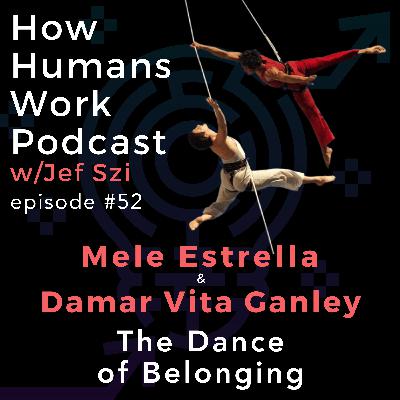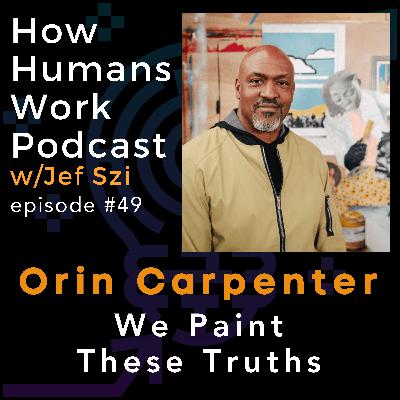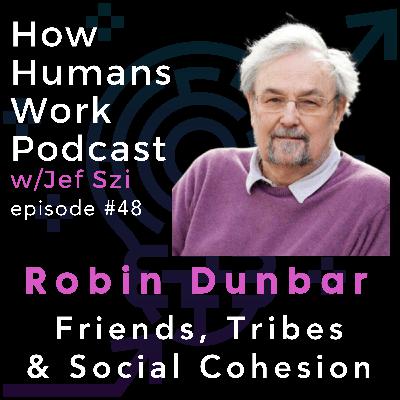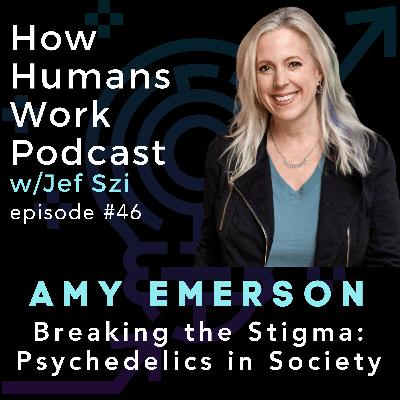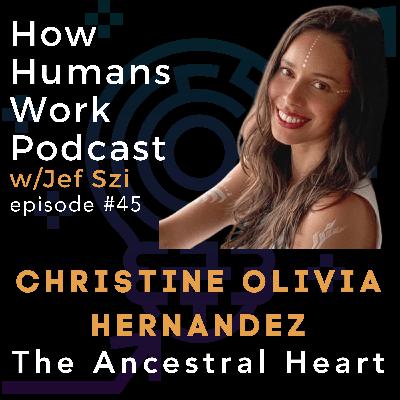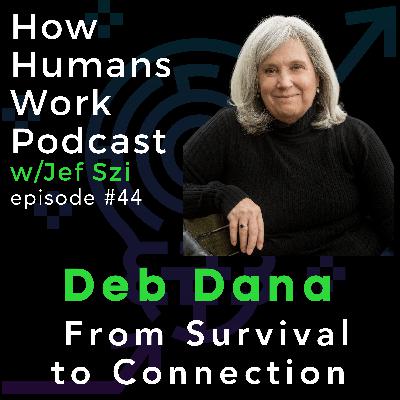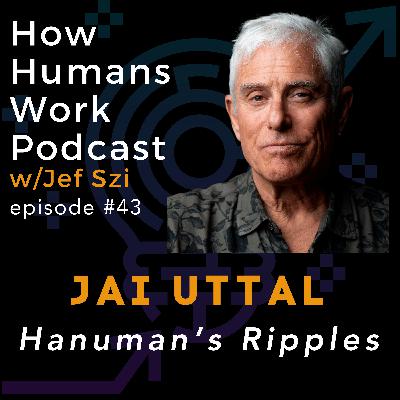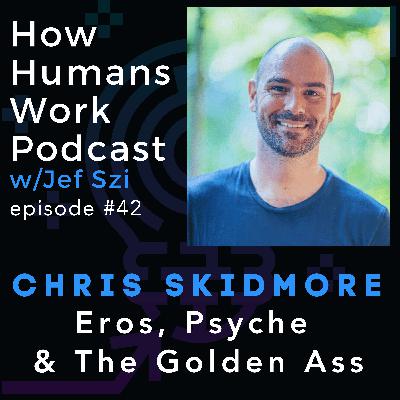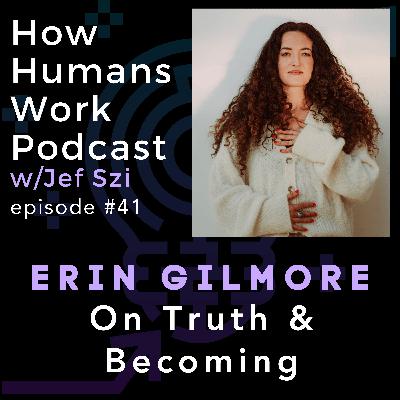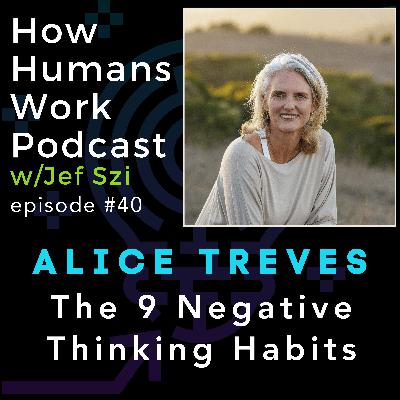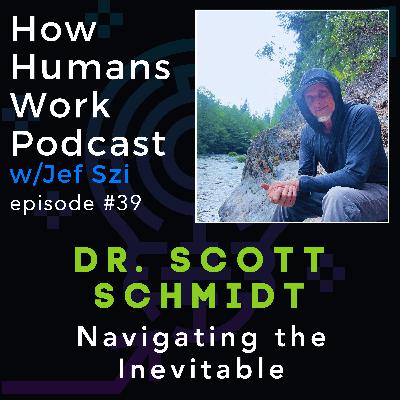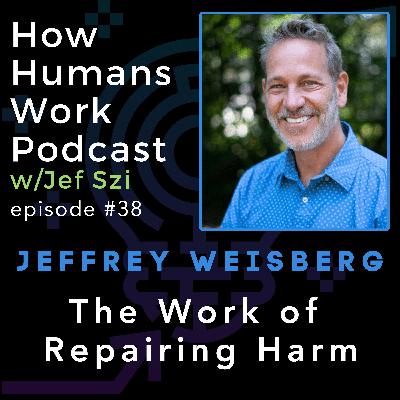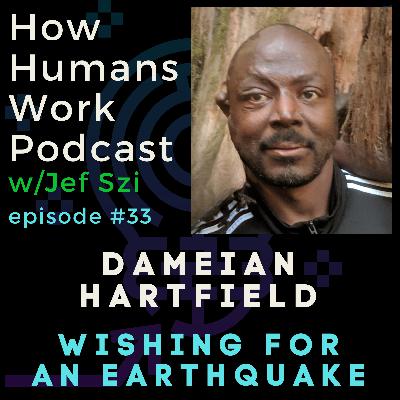Discover How Humans Work Podcast
How Humans Work Podcast

How Humans Work Podcast
Author: Jef Szi
Subscribed: 8Played: 63Subscribe
Share
© Copyright 2025 Jef Szi
Description
Join Jef Szi—renaissance acupuncturist and insatiably curious show host—as he guides us into the labyrinths of human nature.
Each season and each episode explores a central theme through conversations with guests from diverse traditions: thinkers like Robert Sapolsky, Deb Dana, and Michael Meade, alongside artists, activists, and explorers such as Luis J. Rodriguez, Orin Carpenter, and Dossie Easton.
Together, we uncover personal stories and timeless wisdom—insights that stir, resonate, and inspire. Tune in and journey into the forces that shape who we are and how we live as we navigate the personal and the profound.
Consider yourself invited to walk the winding path with the How Humans Work Podcast.
Each season and each episode explores a central theme through conversations with guests from diverse traditions: thinkers like Robert Sapolsky, Deb Dana, and Michael Meade, alongside artists, activists, and explorers such as Luis J. Rodriguez, Orin Carpenter, and Dossie Easton.
Together, we uncover personal stories and timeless wisdom—insights that stir, resonate, and inspire. Tune in and journey into the forces that shape who we are and how we live as we navigate the personal and the profound.
Consider yourself invited to walk the winding path with the How Humans Work Podcast.
61 Episodes
Reverse
Episode SummaryDance artists Mele Estrella and Damara Vita Ganley join show host Jef Szi and the How Humans Work Podcast for an illuminating conversation that explores the rich terrain of their artistic work. Throughout this remarkable episode, we learn about Mele and Damara’s intensive creative ethics, efforts to engender trust, dedication to playfulness, and deep curiosity about the hidden stories around them. As dedicated movement artists, they are a powerful example of how attuning with one’s body, relationships, and the performance spaces acts as a cohesive force. Their craft and their commitment to the process of art is the foundation for their dance, and we are well-instructed by listening to them. In particular, we hear the fascinating backstory to their recent project, Flock. Flock intertwines animal and human migration stories with ecological awareness, showing the importance of belonging through the metaphor of “flocking.” The Dance of Belonging also explores their “Vertical Dance” Bandaloop Project. Using rope and harnesses to dance on the sides of massive objects, like granite faces or skyscrapers, this innovative dance form is a uniquely stunning display of how art can inspire wonder in all of us. Naturally, we discuss the teachings that come with encountering fear as part of the artistic path. We come to find how Mele and Damara use fear as a guide for deeper connection and support, finding confidence in creative belonging.Many thanks to Mele and Damara for helping us see Social Cohesion in action. Through their creative efforts and commitment to authentic connection, we find that social cohesion is not so much a product of external forces but instead begins with our connection to our own bodies and the group of people we create the story of our lives with.*****About Melecio “Mele” Estrella:Mele Estrella is a director, choreographer, and educator who has been with BANDALOOP since 2002. As Artistic Director, Mele brings 2 decades of practice weaving vertical dance, dance theater, somatic facilitation. and ecological belonging to BANDALOOP’s dance making. Mele’s work bridges the everyday personal/social body with the dream body, proposing expanded possibility and awe in our time of poly-crisis. Mele also co-directs Fog Beast, a cross-disciplinary group that affirms ecological connectedness in landscape, live arts and education. He is a longtime member of the Joe Goode Performance Group. Passionate about creating space and sustainability for artists, Mele serves on the advisory boards for the Artists Space Trust and for Arts in California State Parks. He was a Cultural Space Ambassador for the Community Arts Stabilization Trust (CAST), a Leadership Fellow for the Association of Performing Arts Professionals (APAP), and is currently a Lucas Artes Fellow at the Montalvo Center for the Arts.About Damara Vita Ganley:About Damara Vita Ganley:Damara Vita Ganley (she/they) is a movement artist and embodiment guide dedicated to alchemical creativity and connection practices. She meets her work in the world with deep humility, curiosity and a verdant lostness while drawing on extensive national and international creation, performance and teaching experience. She bows in profound gratitude for her long time creative collaborations with Melecio Estrella,...
Episode SummaryIn episode #51, wisdom keeper and astrologer Chris Skidmore, joins the podcast for a profound conversation exploring the intersection of myth, astrology, and social cohesion. Chris and podcast host, Jef Szi, delve into the the 12 House System of Astrology as a "mythic language" and ancient teaching device that can provide guidance for exploring human nature and our social realities. After framing astrology not so much as a predictive tool or literal science, but rather as a rich, symbolic framework for understanding the human condition, Chris and Jef discuss the organization and significance of the 12 house system. Along the way they highlight various features of this "medicine wheel" as an archetypal ally for personal and social development. From there, the conversation homes in on the critical axis of the Fifth and Eleventh houses. Jef and Chris connect this house-system polarity to Jef's recent experience at the Grateful Dead's (Dead and Company) 60th anniversary shows in San Francisco. The performer-audience relationship become the metaphor they use to examine the dynamics between our "individual fire" (the Fifth House's focus on creative self-expression) to "collective connection" (the Eleventh House's domain of community and social contribution). Later on, Jef and Chris call upon a rarely mentioned Greek Olympian God, Hephaestus, to further illuminate to the 5th/11th House axis. Hephaestus is a figure of both woundedness and masterful craftsmanship and lore surrounding his disfigurements.Both The Dead and the Hephaestus become pertinent tales through which the various connections and tensions that occur between the creative soul and social responsibilities can be known—how our personal struggles and creative passions of doing what we love can be supported or troubled by mass, social pressures of our times. What Chris and Jef land on is these matters of love, creativity, shame, and community are not isolated, but are integral to how we navigate our human condition. Ultimately, there's a consequential dance taking place between a life that finds its real loves and pleasures and finding our place and contribution to society. In the beginning, middle, and end, The Astrology of Self-Love, & Society masterfully links personal emotional experiences to a broader, archetypal framework, offering a new way to view our creative lives and the pressures of mass society. I hope you enjoy this conversation and it’s implications as much as I did getting to interview Chris. About Chris Skidmore:Chris Skidmore is the host of On The Soul's Terms Podcast. He is also a practicing psychotherapist, astrologer, biodynamic cranial-sacral therapist who currently resides in Bali. Be sure to drop into Chris's podcast to follow his work on the 12 Houses, or call upon him for an astrology reading.*****
Episode SummaryDr. Arielle Schwartz, Ph.D, is a clinical psychologist, internationally respected teacher, and leading voice in the healing of PTSD and complex trauma. For more than twenty years, Dr. Schwartz has guided therapists in the how-tos of trauma treatments—including EMDR, somatic psychology, parts work therapy, and applied polyvagal theory in yoga and other embodiment practices.In How We Heal, Dr. Schwartz brings her rich expertise of trauma and healing to the podcast. With equal portions of precision and compassion, she provides essential insights into the nervous system, the kinds of stress that drive trauma, and orientations we can embody in the face of today’s social divisiveness. In particular Arielle talks us through Dan Siegel’s “Window of Tolerance” and how we can use awareness of our nervous system tone to improve our mental health. She shows us how isolation is both a source and consequence of trauma, and provides multiple, nuanced distinctions that clarify matters like developmental trauma in childhood, Big T trauma, complex trauma, and the “trauma time” of PTSD. Consider yourself invited to listen-in, as Dr. Schwartz gracefully illuminates the intersection where trauma and society meet. With her wisdom, we come find how trauma-informed communities can foster the heart of goodness, allowing us to mend the frays of our social fabric. *****Books by Dr. Schwartz: The Complex PTSD Treatment ManualThe Polyvagal Theory Workbook for TraumaSomatic Oriented Therapies: Embodiment, Trauma, and Polyvagal PerspectivesApplied Polyvagal Theory for YogaFind a full list of books, trainings, and more at her website.Follow Dr. Schwartz on IG * FB*****
Episode SummaryThe good-hearted and visionary Orin Carpenter joins the podcast this week to explore the connection between art and society. As a fine artist who uses mixed media to make evocative and abstract art with social commentary, Orin carries a rich sense of the artist's social function. Orin's pieces are journeys into the layers of personal experience and American truths. His art deals with themes of identity, race, conflict, change, and healing.Orin's abundant passion for art’s ability to initiate dialogue is the heart of our conversation today, and as we take our next steps in our meditations on Social Cohesion, Orin is a delightful gift and an authentic voice to have in the mix. His wise and creative soul brings body and shape to our adventure, bringing us to new ground and new thought as we consider human nature and America's social contours.We Paint These Truths (Yes, it is meant to echo 'We Hold These Truths') begins with Orin recounting how art entered his life. By providing a compelling portrait of the influences and circumstances that awakened the artist within him, we come to understand the forces that shaped his early life and the incredible response he had to them. Growing up in a black family in the South, being born just a few months after the assassination of Dr. King, finding black characters in Marvel comic books that he could relate with, the local library trips with his mother, the legacies of the Harlem Renaissance, and jazz music and their album covers were all pieces in his purpose puzzle.Along the way, we experience the energy and passion of Orin's art ethos. For him, art is both personal and social. It acts as a medium and metaphorical space that connects people, fosters dialogue, and helps us see each other in ways that debate alone cannot. For Orin, art serves as a conduit for restoring dignity, a means to acknowledge uncomfortable truths and a platform for honest conversations about justice and equity. In a moment of profound honesty, Orin shares the lived truths he navigates in his American experience and the way dualities of belonging have driven his expressions.Throughout the conversation, we find that Orin is a valuable guide, not just in his connection to the power of artistry but also in his rich sense and vision of art as both expression and activism. Orin's spirit of "artivism" encourages us to reconsider the role art plays in shaping our outlook and in its power to create a more compassionate and cohesive society.You're heartily invited to listen in as we journey with Orin and turn the philosopher's stone over together on this matter of Social Cohesion.*****About Orin Carpenter: Orin is a fine artist, high school art teacher, and Doctor of Philosophy in Education. He lives, creates, and works in Northern California.Check out Orin's art and get in touch with him about workshops at his webpage.
Episode SummaryRenowned evolutionary psychologist Robin Dunbar returns for part two of his conversation with Jef Szi and the How Humans Work Podcast, diving deeper into the limits and leaps of human social patterns.In this episode, Professor Dunbar expands on the evolutionary foundations of human relationships, moving beyond social grooming and the endorphin system to explore kinship and the deeper nature of our social lives.He begins by examining the cost and time investment required to maintain our inner circle of intimate friends. From there, he maps out the concentric layers of more peripheral friendships and the behaviors and expectations that characterize them. Dunbar emphasizes the vital role our closest five friends play in our wellbeing and longevity.We then explore how humans scaled up from the group sizes typical of primates to the now-famous “Dunbar’s Number” of 150. This leap—central to the Social Brain Hypothesis—reveals how brain size in primates correlates with social group size, due to the cognitive demands of managing complex, stable relationships.Dunbar illustrates these ideas through compelling examples—courtship, language, and religion—showing how humans have creatively repurposed existing biological mechanisms to sustain cohesion in increasingly larger groups.He also sheds light on how cultural practices like laughter, feasting, ritual, and storytelling serve to bind people together into broad, loosely connected “supergroups.”Ultimately, Dunbar offers a concentric model of our social world, illuminating the patterns, breakthroughs, and constraints of human sociality. This conversation helps us better understand our evolutionary journey and how we might draw on both embodied emotion and cognitive insight to navigate a highly uncertain future.***** About: Robin Dunbar: Robin Dunbar is Emeritus Professor of Evolutionary Psychology at Oxford University. His work in the Experimental Psychology department at the Magdalen College is concerned with ‘trying to understand the behavioral, cognitive and neuroendocrinological mechanisms that underpin social bonding in primates (in general) and humans (in particular).’ Robin is the author of several books, including The Social Brain, Human Evolution, and Friends: Understanding the Power of Our Most Important Relationships. Professor Dunbar is known for advancing the Social Brain Hypothesis with Dunbar’s Number. *****Episode #48 TakeawaysDunbar's number suggests humans can maintain 150 relationships.Time investment is key to strong friendships.Friendships provide emotional support during crises.Social interactions can be as beneficial as medical interventions.Volunteering can substitute for friendships in terms of social exposure.Cohesion in larger groups requires superficial cues and shared knowledge. Friendship layers are assessed within the first four weeks.Common interests determine the depth of friendships.Intuition plays a key role in evaluating relationships.Institutions help manage social cohesion and relationships.Shared knowledge and folklore create larger communities.Religion serves as a stabilizing force in communities.Top-down structures provide discipline, while bottom-up structures foster local identity.Population density poses significant future challenges.Humans have historically found solutions to problems.Optimism is essential for...
Episode SummaryThe equally erudite and jovial Robin Dunbar joins Jef Szi and the How Humans Work Podcast for the first of a two part conversation about limits and leaps of social patterns in primates and humans. An Oxford University professor of evolutionary psychology and someone with a facile grasp of multiple sciences and histories, Professor Dunbar offers us a fascinating account of the social roots of human nature. In part 1—The Chemistry of Connection—we dive deeply into the endorphin system and the how it functions to stabilize social bonds in groups. We come to see freshly how critical a role endorphins play in our day to day reality. Drawing on his rich understanding of touch, primates, and the wildly comprehensive health benefits endorphins, Dunbar illustrates the connections between chemistry, evolution, and the roots of social blueprint—translating it into the very familiar ‘raw feels’ of relationships that inform how we see, think, and feel about the world. In particular, Robin clarifies how and why social grooming assists us in dealing with unique social stresses that accompany a group survival strategy that primate species have. Further, Robin mirthfully shows us the unique elements of the human social tool kit, which activates social glue of endorphins without the time intensive work of touch. Indeed, the social tool kit of humans relies on the beautiful elements of laughter, dancing, singing, feasting, storytelling, and rituals to foster social cohesion. The Chemistry of Connection helps us in on our search for to understand what Social Cohesion is and how we can more successfully find it. Thank you Robin, it was a brilliant blessing to learn so much about human nature and our human story with you!***** About: Robin Dunbar: Professor Dunbar is Emeritus Professor of Evolutionary Psychology at Oxford University. His work in the Experimental Psychology department at the Magdalen College is concerned with ‘trying to understand the behavioral, cognitive and neuroendocrinological mechanisms that underpin social bonding in primates (in general) and humans (in particular).’ Robin is the author of several books, including The Social Brain, Human Evolution, and Friends: Understanding the Power of Our Most Important Relationships. Professor Dunbar is known for advancing the Social Brain Hypothesis with Dunbar’s Number. *****Episode #47TakeawaysSociality is a key evolutionary adaptation for survival.Group living helps solve problems of reproduction and defense.Primates invest heavily in maintaining social relationships.Social grooming triggers the endorphin system, promoting bonding.Humans have developed social tools like singing and dancing to bond.The endorphin system acts as a natural antidepressant.Addiction to opiates can diminish social engagement.Oxytocin plays a role in mother-infant bonding and romantic relationships.Endorphins provide pain relief and promote feelings of well-being.The evolution of sociality is complex and multifaceted. Endorphins enhance social bonding and immune function.Quality friendships are crucial for mental and physical health.Five close friends are optimal for well-being.Social grooming is vital for maintaining relationships.
Episode SummaryThe highly informed and deeply compassionate Amy Emerson joins Jef Szi and the How Humans Work Podcast for a remarkable conversation about the evolving landscape of psychedelics. With her extensive involvement and leadership in the Multidisciplinary Association of Psychedelic Studies (MAPS)* and their multi-year effort to get MDMA approved by FDA as a therapeutic medicine for PTSD. There are few better than Amy who can speak to the state of psychedelics for medical use in society. Not only does Amy share her honest appraisal about FDA drug approval process and members of congress on the Hill, she gives us the little known and fascinating history of MDMA. Some highlights are Sasha and Ann Shulgin’s groundbreaking contributions, the reputational damage MDMA suffered in the 90’s, the long-game efforts of Rick Doblin and others, the powerful way MDMA works on the brain, and the remarkable promise MDMA has shown to help people suffering with PTSD. Put together as a whole, Emerson offers us a destigmatized and inspiring view of MDMA beyond the common street descriptions of Ecstasy and Molly. From MDMA and the Medical Model, Amy then helps us see the many other use-cases for psychedelics that have a long and varied history. Building on issues of trauma and the importance of spiritually reconnecting with ourselves, we walk through the psychological benefits that can come with right-use of psychedelics.Finally, this conversation opens the visions of what future of psychedelic use in society through thoughtful contexts that track safety concerns and how, much like meditation, these ‘medicines’ can have a place in our society like Buddhist and meditation practices have entered our culture. All in all, Breaking the Stigma is a podcast of significance, as it invites us to reconsider our biases around psychedelics at a time when our society is challenged by mental health matters like trauma and the pervasive disconnection from nature and spiritual renewal. ***** About: Amy Emerson is a highly respected leader in the field of psychedelic-assisted therapy. She was Lykos Therapeutics (formerly MAPS PBC) CEO for an important period in advancing MDMA-assisted psychotherapy for post-traumatic stress disorder (PTSD) as a drug with the FDAShe earned a Bachelor of Science in Genetics and Cell Biology from Washington State University and spent the early career involved in roles at pharmaceutical companies, where she contributed to the development of therapies in immunology, oncology, and vaccines .In 2003, she began volunteering with the Multidisciplinary Association for Psychedelic Studies (MAPS), assisting with clinical research monitoring. Her expertise was instrumental in establishing MAPS' clinical department and managing the MDMA Clinical Development Program. When MAPS founded its Public Benefit Corporation (MAPS PBC) in 2014 to develop and commercialize MDMA-assisted therapy, Emerson was appointed CEO .Under her leadership, the organization, later rebranded as Lykos Therapeutics, completed multiple Phase 2 and Phase 3 clinical trials and raised approximately $150 million in funding. The company grew to over 120 employees, all working toward the goal of obtaining FDA approval for MDMA-assisted therapy for PTSD .Amy resigned form her CEO role in September 2024. Currently she is a senior advisor to Lykos and an independent psychedelic research consultant, awaiting the next big adventure.*****Chapters00:00 Introduction and Setting the Stage02:40 The Evolution of Psychedelic Research06:10 Understanding Stigma and Its Origins10:54 MDMA: From Therapy to Recreation16:33 Therapeutic Applications of MDMA20:28 Navigating the FDA and Drug Development24:45 Challenges in the...
Episode SummaryAuthor, healer, and ceremonialist Christine Olivia Hernandez joins the show for an in-depth conversation on the transformative power of gratitude, the wisdom that flows out of Mayan traditions, and the gifts to the heart and body in cacao. Through the lens of her newest book, Remember Your Roots, we dive into the relevance and importance of ancestral lineages, personal stories of loss and healing, the profound value of reclaiming our histories.We begin with Christine introducing us to the beautiful, heart-opening practices of cacao. She shares its ceremonial significance in Mayan and other cultures, highlighting its capacity to reconnect us with our health and gratitude. She also addresses the larger challenges of reconnecting with one’s roots, emphasizing the need to honor both the light and shadow of ancestral histories. We talk through her three-phase model and what the framework offers to us for finding genuine reconciliation and growth in the process of returning to our roots.Later, Christine reflects on her late father’s life and legacy, sharing how her healing journey has been marked by poignant encounters with crows, vivid dreams, and serendipitous events. One powerful moment came when she discovered that her father, Tony “Crow” Hernandez, had helped to build the cultural center where her Remember Your Roots book launch was held!With a deep sense of magic and authentic optimism, Christine embodies what the path of gratitude and a renewed connection to the ancestral heart can look like. For her this is found in her offering, the Maltyox Method, which blends ceremonial use of cacao, meditation, movement, and gratitude. You can learn more about her work here. You are invited into The Ancestral Heart, where we find that a grateful heart is deeply intertwined with the heart of the Earth, where a profound sense of belonging and wholeness returns when we remember our roots and reconnect to the immeasurable depths of the human heart.Christine Olivia Hernandez is the author of Remember Your Roots and ten other books. She is a second-generation immigrant, whose teachers the Maltyox Method, offers cacao ceremonies, and provides spiritual mentorship.
Episode SummaryDeb Dana L.C.S.W. joins the How Humans Work Podcast to illuminate how our nervous systems dance between the ancient survival responses and the instinct to be in states of connection and safety. As an author, renowned Polyvagal Theory lecturer, Deb expertly and compassionately guides us through the ins-and-outs of Polyvagal Theory (PVT), and how it can help us find a more regulated nervous system. At the core, we explore the powerful, bottom-up role of our vagal nerves play in our ability to find safety and connection. Consequently, this show is also a profound conversation about the role of our nervous systems in healing, relationships, stress, and trauma.Throughout a delightful episode, Deb offers heartfelt insight into our human experience as she emphasizes the need for co-regulation and the impact of trauma on our nervous system responses as well as the intersection of Internal Family Systems and Polyvagal Theory. Together. Finally, we explore how environments and collective aspects challenge the nervous systems across contemporary society. Here Deb highlights the importance of creating safe environments for healing and connection has in changing how society handles. In this episode you will learn: How Polyvagal Theory provides a framework for understanding our nervous system. What Neuroception is and how our nervous system perceives safety and danger through neuroception. What the vagus nerve is and how it plays a crucial role in regulating our emotional states. Why Regulation is essential for accessing curiosity, play, and connection. The difference between Stress and Trauma responses, and how we can work with them. How the vagal break helps manage heart rate and emotional responses. Why understanding the nervous system can lead to more effective therapy. Insight into the influences on the collective nervous systems, societal dynamics and healing. Why creating safe environments is key to facilitating healing personally and societally. Deb Dana L.C.S.W., is a renowned clinician, consultant, author, and international lecturer specializing in the application of Polyvagal Theory to trauma treatment and therapy. With a deep understanding of the autonomic nervous system and its role in shaping human behavior and relationships, she has become a a leader in brining PVT insights into practical tools for therapists, healthcare providers, and individuals seeking healing.Deb is also the developer of the Rhythm of Regulation clinical model, which integrates Polyvagal Theory into therapeutic practices, emphasizing safety, connection, and co-regulation as the foundation for emotional and psychological well-being. Additionally, Deb has authored several influential books, including The Polyvagal Theory in Therapy: Engaging the Rhythm of Regulation and Anchored: How to Befriend Your Nervous System Using Polyvagal Theory, as well as the co-edited work Polyvagal Exercises for Safety and Connection.YouTube Chapters:00:00 Introduction and Background 02:11 The Role of the Nervous System in Human Experience 08:25 The Vagus Nerve: Anatomy and Function a...
Episode SummaryThe storied and kind-hearted Jai Uttal drops into the show for an extended conversation about music, monkey gods, gurus, India, sobriety, family, and ultimately the spiritual path of healing through love. We begin with an exploration of Jai’s current practice of hyper-local kindness in a world where that resource is becoming increasingly scarce. From there we dive into Jai’s latest musical offering, Hanuman Chalisa for World Peace. Not only does Jai share with us the intimate practice he’s had with this widely venerated chant for over five decades, but he walks us through the creative context in which his first published recording of the Chalisa came to life. In his telling we gather the rich array of inspirations that bring about his creative gifts.Gradually, Jai invites us into the richness of his life, as he retells how the winding threads that have made up the fabric of his life came to be. We come to understand the overlapping events and energies of kirtan, India, gurus, dreams, drugs, anxieties, singing, but mostly love and family, have been ripples of his life. Along the way we hear about his intersections with Steve Jobs, Ali Akbar Khan, Neem Karoli Baba, Ram Das, and others. We hear about his initiation into kirtan, Indian classical music, and his profound relationships that unfolded with musical and spiritual masters. We also hear about the struggles with finding his voice, performing, and managing the pains of life with drugs and alcohol before he found his true loves in his wife Nubia and in becoming a father to his son, Ezra. In the beginning, middle, and end, the beloved monkey god, Hanuman, walks with us, serving as a back-drop of Jai’s own spiritual journey as he realizes the profound and ordinary teachings love and devotion have in his, just like every other human life. A beautiful conversation that bares the heart in a way that we can’t help but be moved by. About: Jai Uttal is a husband, father, neighbor, and friend. He’s more widely know for being a Grammy nominated sacred music composer, recording artist, multi-instrumentalist, and ecstatic vocalist. Jai combines influences from India with influences from American rock and jazz, creating a stimulating and exotic multi-cultural fusion that is truly world spirit music.Jai has been leading, teaching and performing kirtan around the world for close to 50 years, creating a safe environment for people to open their hearts and voices.
Episode SummaryIn episode 42, we take a deep dive into the realm of myth with insightful and heartfelt Chris Skidmore. As an astrologer, psychotherapist and host of the On the Souls Terms Podcast, Chris helps illuminate the meaning and embedded knowledge hidden inside the 1800 year old Roman novel: The Golden Ass. This text is where the first telling of The Marriage of Eros and Psyche is found. Together, Chris and your show host Jef Szi take an extended journey into these rich and poignant tales that are saturated with symbolism, archetypes, relatable folly, and knowledge that help us make sense of our own human condition.The show begins with Chris sharing about his recent trip to Greece and Italy—the actual landscape where these stories took place. From there we build a Jungian context in the spirit of Marie Louis Von Franz before a recounting of The Golden Ass, where the main character, Lucius, accidently ends up being turned into an ass. Caught is ass-form, Lucius experiences a great deal of folly and suffering. Moved by the elements in the story, Chris and Jef explore the meaning and medicine this overlooked tale offers as we seek to reconcile our own lives with the greater forces and events we experience. Next, they then turn their attention the Psyche and Eros story. Recounting the events of this monumental myth around love and soul, they drink deeply from the profound images and details found there. In particular, we come to see how this myth offers insights and teaching into the journey of love, of maturation, and our complex dynamics that come with individuation.With a superb attention to the heart along with beautiful renderings and teachings found in The Golden Ass and The Marriage of Eros and Psyche, Chris offers us perspective on our humanity while simultaneously fostering our connection to the artistic and soulful roots of the ancient Greco-Roman imagination.About Chris Skidmore: Chris Skidmore is a psychotherapist, astrologer, biodynamic cranial-sacral therapist who resides in Bali. He is also the host of On The Soul’s Terms Podcast. You can learn more about Chris work and check-out his podcast by going to his website.
Episode SummaryIn this next adventure into our Systems of Knowledge theme, the highly relatable and beautifully honest Erin Gilmore joins the podcast. This conversation explores how various teachings are points of refuge and healing as we make our way on the path adulting. Erin opens up about her journey with ADHD and the knowledges that have helped her. Specifically, how how the practice of yoga and movement became a foundation for making sense and meaning in her life.Along the way, we also learn how Meditation with Jeff Warren, Non-Violent Communication practices with Judith Hanson Lasater, and Trauma-Informed Yoga have been anchors for growth and self understanding in the process of becoming. Without pretense our proclamation, Erin offers unvarnished truth about her story and the encounter with life’s uncertainties and changes. From the listening skills that come with NVC or the ritual wisdom found in esoteric teachers, Erin shows us how embracing the knowledges has supported her self-acceptance and strengthened her anchor. About Erin: Erin Gilmore is a San Francisco-based yoga teacher with a unique modern style. She is also a student and teacher of Non-Violent Communication. Her experiences with Trauma-Informed yoga transformed her life and yoga practice. She lives in San Francisco, California with her husband and two children.Try Her Living Room Yoga ClassFollow Erin on Social
Episode SummaryAlice Treves is seasoned psychotherapist with a background in Hakomi, CBT, Internal Family Systems (IFS), and Psychedelic Assisted Therapy. This is her second time joining the podcast. She and Jef Szi have been together for 27 years and have two daughters.In this episode we dive into The 9 Negative Thinking Habits, a CBT framework* Alice uses as part of her therapy practice to help both teens and adults. By breaking down each of the 9 Habits (Catastrophizing, Fortune Telling, Mind-Reading, Blaming, I Can’t, Zooming in on the Negative, All-or-Nothing, I Should/You Should, & It’s Not Fair) we peer under the hood of our mental habits. Alice shows us how "The Four C’s" -- catching, checking, getting curious, and changing habitual thinking with helpful thoughts, can improve our cognitive experience. Along the way, Alice and Jef lean on their marriage and shared intellectual interests to deepen the exploration of our mental capacities by considering how our thoughts are expressions of developmental needs, evolutionary adaptations, and a validation of the parts perspective found in Internal Family Systems Model. With equal measure of compassion and insight, Alice’s experience gives us a valuable sense that we don’t have to be run by our thought habits. Indeed, there are tools and perspectives that can help change. In the last portion of this conversation, Alice enrichens our sense of negative thinking patterns by tying them to the archetypes found in astrology. By making a connection between the hard lessons of life (which are attributed to the planet Saturn in astrology) and our encounters with thinking habits, she fosters a greater sense of the mind’s depths and how we can work with our human nature. About Alice: Alice Treves LCSW is a psychotherapist who works with adults, teens, and families, offering guidance and support for life’s many challenges. To learn more about her practice, you can visit her website. About The 9 Negative Thinking Habits: The negative thinking types are sourced from a workbook that helps teens (and adults) work with their negative thinking habits. The title is Conquer Negative Thinking for Teens, written by Mary Karapetian Alvord and Anne McGrath. We thank the authors for their work and insights.
Episode Summary:Dr. Scott Schmidt joins the podcast to share his knowledge about caring for those with serious illness and those who are in the dying process. As a medical doctor with an expansive background in Emergency Medicine, Hospice Care, and now as a leader in the Primary Palliative Care field, Scott invites us to consider how we go about the realities that surround end-of-life. Along the way, we get a solid sense of what kind of attitudes, questions, and conversations are needed from both sides of the medical encounter. But don’t be fooled, this episode has teachings for the healthy as much as for those with serious health challenges. In considering the inevitable fate of all bodies, Dr. Schmidt shows us how we can be more prepared and receptive to our individual impermanence at any point in our lives. Indeed, we come to see how forethought can help us be present and feel less overwhelmed in more trying times.Further on in the podcast, we learn how Scott’s encounters with live-saving measures and his natural inclination toward helping those facing illness and death pushed him forward to being a leader in the Primary Palliative Care approach. Towards the end of the show, we get a very real glimpse into the difficulty of modern medicine, with its messy and often morally distressing dilemmas.With depth and humility in the face of the unknowable, this conversation is a remarkable one for both the significances that occur in the latter stages of life, and also with the genuine soulfulness Dr. Schmidt brings to these moving encounters. As he says, navigating serious illness and the inevitability of death is no simple thing. About Dr. Scott Schmidt: Scott Schmidt is an Emergency Medicine doctor and cultural change leader who is charged with developing Primary Palliative Care competencies. About Primary Palliative Care: is a subspecialty of medicine, that seeks to plan and address serious illness situations with an orientation to minimize suffering while tending to the whole person. Considered an upstream evolution from Palliative Care, Primary Palliative Care seeks to support Palliative Care competencies in all providers and teams.
Episode SummaryIn The Work of Repairing Harm, the warm-hearted Jeffrey Weisberg joins the podcast for a rich and moving conversation about his experience with Peacebuilding and Restorative Justice practices. As the Executive Director and co-founder of the River Phoenix Center for Peacebuilding, Jeffrey shares his perspective and insight on the incredible value these practices have for relationships of all shapes and sizes. With equal amounts of energy, vision, and honesty, Jeffrey walks us through the key questions and approaches of what it takes to repair harm. Whether that is the challenges of refugees in Uganda trying to work through the pressures and hardships of living in a refugee camp, the impact fights on school campuses can have, or the longstanding mistrust between black and brown youth and police departments across America, Jeffrey provides a convincing portrait of how Restorative Justice and other Peacebuilding efforts are a profound resource for dealing with conflict. Specifically, he describes how four key questions and a good dose of thoughtful preparation and finesse, can create a space for repairing harm by discovering 1) What happened? 2) What was the impact? 3) How can we repair the harm? and 4) How can we ensure it doesn’t happen again? Later in the show, Jeffrey emphasizes the importance of multipartiality in his work. Multipartiality advocates for ensuring all voices are elevated in the Restorative Justice process and equity work in general. It is essential for trust-building across communities with different concerns and experiences, particularly in light of racial disparities still happening. With nuance and humility, we come to learn that, yes, the work of equity requires sincere effort and care from everyone involved.We also get a powerful glimpse into why truth-telling and deep listening are at the core of repairing human relationships as we discuss the Police Youth Dialogue Model. Police Youth Dialogues bring together Police officers and the black and brown youth in the communities they serve to listen to each other’s experiences. Jeffrey’s tales from these events prove to be a moving and inspiring example of how differences can be bridged through communication.Throughout Episode #38, we get real and vital pictures of how peacebuilding and restorative justice can transform relationships, support communities, and change the way we deal with transgressions and injuries. Ultimately they offer us a pathway to reconnection. It is an honor to hear tales from one so heartfully committed to doing The Work of Repairing Harm as our guest, Jeffrey Weisberg. About Jeffrey Weisberg: Jeffrey is the Executive Director and co-founder of the River Phoenix Center for Peacebuilding. He has designed, developed, and implemented a wide range of programs and services in his local community of Gainesville, Florida, throughout the United States and in countries throughout the world. His work with youth includes police/youth dialogues, student/educator dialogues, peer mediation, juvenile diversion programs, social/emotional learning, restorative justice, youth empowerment, and coming-of-age programs. For the past 25 years, Jeffrey has served as a Florida Certified State Mediator and mediates cases involving juvenile offenders, family disputes, and conflicts within small businesses and organizations. In addition, he is using Restorative Practices to support the Department of Juvenile Justice, the court system, schools, prisons, and communities to bolster alternatives to the punitive model. He is a founding member of The Peace Alliance. He believes that by training and empowering both youth and adults to learn and practice vital communication skills, we not only create greater connections with others, but we can de-escalate conflict for safer and more productive outcomes.
Episode #37 SummarySenior Zen Dharma teacher, Fu Schroeder, sits down with Jef Szi for a heart-felt and mind-opening exploration of Zen Buddhism. As a System of Knowledge, Zen is one of the great wisdom lineages—handed down across centuries and into the lap of Fu in the 1970’s.This delightful conversation offers our community a nourishing encounter with a Zen elder—a holder of wisdom who can provide gems for facing life’s mysteries and hardships. With much kindness and a great deal of playful insight, Fu shares key elements of the Zen way and her path with it. She offers us gems for how we can face our mind, our suffering, and the vastness of being. She shows us how the path of Zen—quietude, or “just sitting,” gives us access to calm and negotiate change and the jaw-dropping truth of impermanence. In this show, we come to learn how Zen offers mental clarity and abiding presence for the human soul. Born out of Buddha's path and transmitted for generations, Fu walks us through the accuracy and the medicine of the Four Noble Truths. We find we are not the first to struggle with the nature of the mind or the reality of death.Episode #37 invites us into the teachings of the Zen path. In Fu, we find a kind, frank, and mirthful sojourner, who is not only a fantastic conversationalist but a teacher who is equally poetic and practical. Listen in to this one because it is not often in today’s world someone can steadfastly point us toward the vastness of reality—be it the experience of the Moon, the sound of the rain, or the courage to Leap into the Yellow River. About Fu: Furyu Nancy Schroeder, a resident of San Francisco Zen Center since the 1970s, became Abiding Abbess at Green Gulch Farm Zen Center in March 2014 and stepped down from that role in March 2023. Fu has held most of the monastic positions at SF Zen Center and has been an active supporter of programs for children, people of color, the gay and lesbian community, and the interfaith community. In 2008 she was elected to the Marin Women's Hall of Fame, and in 2010 she was appointed to the Board of the Marin Community Foundation. In addition, she has previously co-led SF Zen Center's Contemplative Caregiver Course. She received Dharma Transmission from Tenshin Reb Anderson in 1999.
We kick off Season Four with the fun and forthright Dalanah Smith. Dalanah is an astrologer, stoic, palmist, biologist, and host of the Moon Matters Podcast. In this episode, she shares her take on one of the most ancient systems of knowledge around - Traditional Astrology, a.k.a. Hellenistic Astrology. Also joining the podcast is episode co-host, Tobin Mayell. Tobin is a dear friend and a student of astrology. In this conversation, Dalanah illuminates how the astrological system can help us understand the fabric of our fate. By looking at the planetary placements at the time of our birth, we have an interesting skeleton key to who we are and how our life progresses. In this wide-ranging show, Dalanah shares what called her to a path rich with astrology and myth, and how the astrological worldview, along with stoicism, has offered her a kind of cosmological guidance that is helpful to her and her clients. Along the way, Dalanah offers up a healthy buffet of astrological basics, including the seven planets, the 12 houses, the moon in different elements, and the lunar nodes with a very cool myth about Rahu and Ketu. Dalanah also reads a handful of placements in Jef’s Natal Chart, demonstrating the power of astrology to see into people’s innermost natures. In the face of life’s twists and turns, Dalanah teaches us how the knowledge of our astrological configurations can help us recognize and navigate various tensions in our lives, making astrology an ally for development and self-cultivation. If you are curious about Systems of Knowledge and how they can help make sense of our human nature, then an encounter with the astrological imagination is a legitimate place to begin. For in metaphor and thought, the body of ideas in the ancient ways of astrology have something very direct and intimate to say to all of us. About Dalanah Smith: Dalanah wears many hats, but the ones closest to her heart are Astrologer and practicing Stoic. Her formal education is in science, as she has a B.S. in Biology and a minor in Psychology. During her time in school, she was focused on learning hard science. After a decade of being a scientist, she now uses those skills of critical analysis to assist her in navigating a more spiritual landscape. She often credits her days in the laboratory for allowing her to view the world with a non-biased lens and for her knack for pattern recognition.As a 3rd House Sun and ste llium, she has the Soul of an ethereal trickster. Using her innate gift of storytelling, she weaves the tale of personal mythology by analyzing her client’s unique celestial code.
In episode #35, legendary professor and author Robert M. Sapolsky joins the show for a fascinating conversation about his most recent book: Determined. At length we discuss what life looks like when we accept the premise of Determined: free will is a myth and rewarding and punishing behavior is an outdated approach to running a humane and just world. Along the way we get into strange and groovy notions like Emergent Complexity, Chaoticism (a.k.a. The Butterfly Effect), the prefrontal cortex, and my personal passion, stress. With abundant erudition and mirth, Dr. Sapolsky makes the case several time over that a separate self with a free will apart from the biologic matrix is simply untenable. Along the way, Robert walks us through the arguments which support Determinism, starting with our inability to perceive our intentions and then showing us how brain neurons, slime molds, and ants operate without a blueprint. Overall, we get a persuasive portrait of how and why the seamless web of biology and environment have an unseen hand in how we act and think.Best to get your thinking cap out and put it on, because this show puts all of our assumptions about how humans work on the surgical table. Whether they survive the rigor of a sage professor’s operations is the question we’re left with. I hope you enjoy this show as much as I did!About Robert M. Sapolsky: Dr. Sapolsky is the author of several works of nonfiction, including A Primate’s Memoir, The Trouble with Testosterone, and Why Zebras Don’t Get Ulcers. His most recent book, Behave, was a New York Times bestseller and named a best book of the year by The Washington Post and The Wall Street Journal. He is the John A. and Cynthia Fry Gunn Professor of biology, neurology and neurosurgery at Stanford University and the recipient of a MacArthur Foundation “Genius Grant.” He and his wife live in San Francisco.
Episode SummaryIn episode #34, the esteemed author of Dopamine Nation, Dr. Anna Lembke, returns to the show for a fascinating conversation about stress, dopamine, and how the two intersect. With an equal measure of kindness and expertise, Dr. Lembke walks us through the contours of both addiction and stress. Along the way she reinforces the challenges we face living in a time, what she calls the Plenty Paradox. Throughout this remarkable conversation, Anna gives compelling reasons to value hardship, stress, and truth-telling, for each of them has a convincing way of bringing balance back into our lives. Whether you are young, old, or somewhere in the middle, you are heartily invited to listen, because we all need to hear the wisdom flowing from About Dr. Lembke: Dr. Lembke is a psychiatrist, professor, researcher, and the medical director of Stanford Addiction Medicine. Dr. Lembke is also the author of Dopamine Nation, a salient book that explores the neuroscience of addiction and the lessons we can learn from those who’ve been caught in its powerful spell.
Episode SummaryIn Episode #33, Dameian Hartfield joins the podcast for a deeply honest conversation, recounting some of the major moments in his life. In many respects, this podcast is a continuation of an ongoing conversation we have had as friends for nearly two decades, where Dameian speaks his truth and in doing so acts as an ambassador for the greater good, sharing the realities of what comes with growing up in an at-risk community like the Nickerson Gardens Housing Projects in the Watts neighborhood. Beginning the show with his reasons for a slow-cook approach to doing this podcast and then his experiences doing gang-intervention work and some of the key dilemmas and pressures that went with it, we get a feel for the values and lessons Dameian has earned in his life. For example, he describes how political agendas and lack of trust between different organizations in a community add more pressure to one’s that are already struggling. We also see how he positioned himself in relation to those politics. Following that, we begin to hear about the challenges that come with life after being in a gang. The uphill battle of re-establishing a positive reputation along with carrying the war-like events of street battles without a reconciliation process to move forward in the way military veterans have is a hard edge to have in one's reality. Sharing with us some details of his journey, like being shot at the age of fifteen and having to deal with conflict zones like ‘Hamburger Hill,’ we come to learn why the trauma of being a young, misdirected, urban warrior would need healing places like the one where we first met — at a men’s retreat held by the Mosaic Multicultural Foundation deep in the redwoods of Mendocino, California. It was there Dameian and I have formed a relationship that has transcended our native neighborhoods and social upbringings. Next, Dameian takes us into the powerful decisions and transformations that took place for for him as he spent a decade in prison, repaying his debt to society. We hear how he learned to become a communicator, leaving behind his older strategies of simply acting in ways that he thought were needed. Dameian made key decisions to use his prison sentence for his own personal development, even knowing he had a very real possibility of never making it out. In this part of the podcast, we get some profound contours of Dameian’s path through this important period of change and soul searching. Further on we learn about how, when he was on the run for a case against him, his relationship with his mother kept him from getting into deeper trouble, perhaps even getting killed. Dameian also walks us through how his Mom imparted to him the realities of the financial struggles they had, and pulled along his questions and challenges into a place of greater understanding and participation in the struggle. Even in his darkest moments of despair, his Mom was able to help him see beyond his hopelessness. In these stories we get a powerful picture of his mom’s capacity to guide in the face of adversity, and the important impact that had. In total, this powerful, authentic episode takes us underneath the illegality of gang life in an at risk community, providing us with a sincere portrait of the human lives in and around those situations. And just when we think we are wrapping up, Dameian takes us a step further into his life experiences. He closes out our conversation with an incredibly moving and undeniable accurate portrait of what the challenges of being a black man in the American story is like. *****Dameian Hartfield primarily grew up in Nickerson Gardens housing projects in Los Angeles, California. He also spent part of his youth in Pomona, CA. Currently, Dameian spends his time growing his company, 1 Tamu Essentials, with his wife Dana, and spending time with his kids and grandkids. Mr. Hartfield


